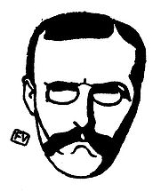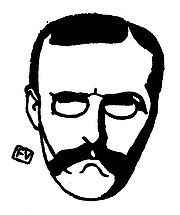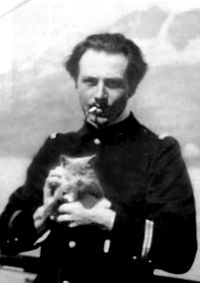
Polyphème
Encyclopedia
Polyphème is an opera composed by Jean Cras
with a libretto by Albert Samain
. It was written by Cras during World War I
and was premiered in Paris in 1922, giving Cras a burst of notoriety in the French press.
 The text originated as a poetic drama written by Samain in the style of Maurice Maeterlinck
The text originated as a poetic drama written by Samain in the style of Maurice Maeterlinck
. The title character is Polyphemus
, who, according to Greek mythology, is the eldest Cyclops
and son of Poseidon
. It tells the well-known story of the attempt by Polyphemus (baritone) to steal Galatea
(soprano) from Acis
(tenor). In the original myth Polyphemus eventually rolls a rock onto the lovers, killing Acis. Samain humanized Polyphemus, who is portrayed as an oafish but sincere figure who is at ease with children but becomes awkward when trying to communicate with adults. There is no suggestion that he is not fully human (the text makes it clear that he has two eyes), but he is portrayed as a morose and solitary forest dweller who hopelessly yearns for love. Eventually he becomes aware of the feelings shared by the two lovers and, though he looms over them with a heavy boulder, decides not to crush them. Ultimately, the cyclops puts his eyes out like Oedipus
and wanders into the sea to find death because the couple's happiness together horrifies him.
 Cras encountered Samain's dramatic poem in 1910, ten years after its author's death. He adapted it by dividing it into four rather than the original two acts and slightly pruned the longer speeches. He described the work as a "lyric tragedy" rather than an opera, since there is very little action. The drama proceeds through a series of arcadian pastoral tableaus punctuated by Polyphème's long brooding soliloquies and his obsessive interrogations of Galatée's young brother Lycas.
Cras encountered Samain's dramatic poem in 1910, ten years after its author's death. He adapted it by dividing it into four rather than the original two acts and slightly pruned the longer speeches. He described the work as a "lyric tragedy" rather than an opera, since there is very little action. The drama proceeds through a series of arcadian pastoral tableaus punctuated by Polyphème's long brooding soliloquies and his obsessive interrogations of Galatée's young brother Lycas.
Cras completed the music in 1914, working on the orchestration while serving in the French navy during the Adriatic campaign
of World War I. The music is impressionistic, restless, and highly chromatic, in the spirit of Chausson
and Duparc. Polyphème's depression is marked by the use of diminished seventh chords and tortuous figures. The influence of Debussy's La Mer
and his opera Pelléas et Mélisande
is also noticeable, especially in the use of whole tone scales.
in Paris in December 1922. It was conducted by Albert Wolff and directed by Albert Carré
. It was revived in 1924.
Act 2: Galatée describes Polyphème's disturbing behaviour to Acis, who expresses his dislike of Polyphème. Galatée says he is to be pitied. The lovers canoodle together. Lycas tries to get the lovers to play with him, but they fob him off.
Act 3: Polyphème broods over his own isolation, and forces Lycas to describe the intimacy of the lovers. Polyphème's bitter obsession frightens Lycas, who pleads with him not to hurt Galatée.
Act 4: Acis and Galatée canoodle together once more and discuss Polyphème's increasingly morose behaviour. The Nymphs and Swains dance and sing of love. As Acis and Galatée fall asleep in each other's arms, the god Pan
appears and blesses the lovers. They wake and renew their devotion to one another. Polyphème appears above them with a rock, overhearing the lovers' romantic intimacies, and feels his own ugliness. He leaves in despair. Acis leaves and Galatée ponders love as she hears a mysterious yell of pain in the forest. She falls asleep. Polyphème arrives, blinded. Lycas helps him to touch the sleeping Galatée for the last time. Polyphème then tells Lycas that he is going to walk into the sea.
conducting the Luxembourg Philharmonic Orchestra
and with Armand Arapian in the title role.
Jean Cras
Jean Émile Paul Cras was a 20th century French composer and career naval officer. His musical compositions were inspired by his native Brittany, his travels to Africa, and most of all, by his sea voyages...
with a libretto by Albert Samain
Albert Samain
Albert Victor Samain was a French poet and writer of the Symbolist school.Born in Lille, his family were Flemish and had long lived in the town or its suburbs. At the time of the poet's birth, his father, Jean-Baptiste Samain, and his mother, Elisa-Henriette Mouquet, conducted a business in "wines...
. It was written by Cras during World War I
World War I
World War I , which was predominantly called the World War or the Great War from its occurrence until 1939, and the First World War or World War I thereafter, was a major war centred in Europe that began on 28 July 1914 and lasted until 11 November 1918...
and was premiered in Paris in 1922, giving Cras a burst of notoriety in the French press.
Text

Maurice Maeterlinck
Maurice Polydore Marie Bernard Maeterlinck, also called Comte Maeterlinck from 1932, was a Belgian playwright, poet, and essayist who wrote in French. He was awarded the Nobel Prize in Literature in 1911. The main themes in his work are death and the meaning of life...
. The title character is Polyphemus
Polyphemus
Polyphemus is the gigantic one-eyed son of Poseidon and Thoosa in Greek mythology, one of the Cyclopes. His name means "much spoken of" or "famous". Polyphemus plays a pivotal role in Homer's Odyssey.-In Homer's Odyssey:...
, who, according to Greek mythology, is the eldest Cyclops
Cyclops
A cyclops , in Greek mythology and later Roman mythology, was a member of a primordial race of giants, each with a single eye in the middle of his forehead...
and son of Poseidon
Poseidon
Poseidon was the god of the sea, and, as "Earth-Shaker," of the earthquakes in Greek mythology. The name of the sea-god Nethuns in Etruscan was adopted in Latin for Neptune in Roman mythology: both were sea gods analogous to Poseidon...
. It tells the well-known story of the attempt by Polyphemus (baritone) to steal Galatea
Galatea
Galatea is an ancient Greek name meaning "she who is milk-white".Galatea or Galathea may refer to:-In mythology:* Galatea :**Galatea, a woman who prayed for her daughter to be turned into a son, Leucippus...
(soprano) from Acis
ACIS
The 3D ACIS Modeler is a 3D modelling kernel owned by Spatial Corporation . ACIS is used by many software developers in industries such as computer-aided design , Computer-aided manufacturing , Computer-aided engineering , Architecture, engineering and construction , Coordinate-measuring machine...
(tenor). In the original myth Polyphemus eventually rolls a rock onto the lovers, killing Acis. Samain humanized Polyphemus, who is portrayed as an oafish but sincere figure who is at ease with children but becomes awkward when trying to communicate with adults. There is no suggestion that he is not fully human (the text makes it clear that he has two eyes), but he is portrayed as a morose and solitary forest dweller who hopelessly yearns for love. Eventually he becomes aware of the feelings shared by the two lovers and, though he looms over them with a heavy boulder, decides not to crush them. Ultimately, the cyclops puts his eyes out like Oedipus
Oedipus
Oedipus was a mythical Greek king of Thebes. He fulfilled a prophecy that said he would kill his father and marry his mother, and thus brought disaster on his city and family...
and wanders into the sea to find death because the couple's happiness together horrifies him.
Composition

Cras completed the music in 1914, working on the orchestration while serving in the French navy during the Adriatic campaign
Adriatic Campaign of World War I
The Adriatic Campaign of World War I was a naval campaign fought during World War I between the Central Powers, and the Mediterranean squadrons of Great Britain, France, the Kingdom of Italy, Australia and the United States.-Characteristics:...
of World War I. The music is impressionistic, restless, and highly chromatic, in the spirit of Chausson
Ernest Chausson
Amédée-Ernest Chausson was a French romantic composer who died just as his career was beginning to flourish.-Life:Ernest Chausson was born in Paris into a prosperous bourgeois family...
and Duparc. Polyphème's depression is marked by the use of diminished seventh chords and tortuous figures. The influence of Debussy's La Mer
La Mer (Debussy)
La mer, trois esquisses symphoniques pour orchestre , or simply La mer , is an orchestral composition by the French composer Claude Debussy. It was started in 1903 in France and completed in 1905 on the English Channel coast in Eastbourne...
and his opera Pelléas et Mélisande
Pelléas et Mélisande (opera)
Pelléas et Mélisande is an opera in five acts with music by Claude Debussy. The French libretto was adapted from Maurice Maeterlinck's Symbolist play Pelléas et Mélisande...
is also noticeable, especially in the use of whole tone scales.
Premiere
The opera won the first Ville de Paris Prize in 1921, and was first performed at the Opéra-ComiqueOpéra-Comique
The Opéra-Comique is a Parisian opera company, which was founded around 1714 by some of the popular theatres of the Parisian fairs. In 1762 the company was merged with, and for a time took the name of its chief rival the Comédie-Italienne at the Hôtel de Bourgogne, and was also called the...
in Paris in December 1922. It was conducted by Albert Wolff and directed by Albert Carré
Albert Carré
Albert Carré was a French theatre director, opera director, actor and librettist. He was the nephew of librettist Michel Carré and cousin of cinema director Michel Antoine Carré...
. It was revived in 1924.
Roles
- Polyphème - Baritone
- Galatée - Soprano
- Acis - Tenor
- Lycas - Alto
- Un sylvain - Tenor
- Une nymphe - Soprano
- Pan - (non singing)
Synopsis
Act 1: Nymphs and Swains celebrate the charms of nature. Polyphème feels alienated and embittered because the teenage Galatée no longer loves him as she did when she was a child. He asks Lycas, Galatée's young brother, to describe her feelings. Lycas laments that Galatée no longer plays with him, but spends her time with her lover Acis. Polyphème attempts to rekindle his relationship with Galatée by bringing her gifts, but realises that she has no feelings for him. He frightens her when he blurts out his intense love for her and tries to stop her leaving by force, but he finally lets her go.Act 2: Galatée describes Polyphème's disturbing behaviour to Acis, who expresses his dislike of Polyphème. Galatée says he is to be pitied. The lovers canoodle together. Lycas tries to get the lovers to play with him, but they fob him off.
Act 3: Polyphème broods over his own isolation, and forces Lycas to describe the intimacy of the lovers. Polyphème's bitter obsession frightens Lycas, who pleads with him not to hurt Galatée.
Act 4: Acis and Galatée canoodle together once more and discuss Polyphème's increasingly morose behaviour. The Nymphs and Swains dance and sing of love. As Acis and Galatée fall asleep in each other's arms, the god Pan
Pan (mythology)
Pan , in Greek religion and mythology, is the god of the wild, shepherds and flocks, nature, of mountain wilds, hunting and rustic music, as well as the companion of the nymphs. His name originates within the Greek language, from the word paein , meaning "to pasture." He has the hindquarters, legs,...
appears and blesses the lovers. They wake and renew their devotion to one another. Polyphème appears above them with a rock, overhearing the lovers' romantic intimacies, and feels his own ugliness. He leaves in despair. Acis leaves and Galatée ponders love as she hears a mysterious yell of pain in the forest. She falls asleep. Polyphème arrives, blinded. Lycas helps him to touch the sleeping Galatée for the last time. Polyphème then tells Lycas that he is going to walk into the sea.
Recording
A recording of this opera was released in 2003, with Bramwell ToveyBramwell Tovey
Bramwell Tovey, OM is an English-born Grammy Award winning conductor and composer. His musical roots are in The Salvation Army. He was educated at Ilford County High School, the Royal Academy of Music and the University of London. His formal music education was as a pianist and composer...
conducting the Luxembourg Philharmonic Orchestra
Luxembourg Philharmonic Orchestra
The Luxembourg Philharmonic Orchestra , abbreviated to OPL, is the national orchestra of Luxembourg, and is based in Luxembourg City. The orchestra formerly performed at the Grand Théâtre de la Ville de Luxembourg and the Conservatoire de Luxembourg...
and with Armand Arapian in the title role.

